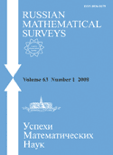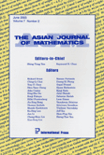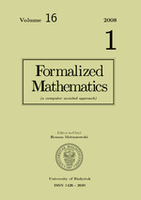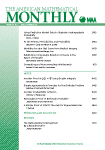
RUSSIAN MATHEMATICAL SURVEYS
Scope & Guideline
Empowering mathematicians through comprehensive surveys.
Introduction
Aims and Scopes
- Theoretical Mathematics:
The journal emphasizes the development of mathematical theories across various fields such as algebra, geometry, topology, and analysis, providing a robust framework for understanding complex mathematical concepts. - Applied Mathematics:
It includes studies that apply mathematical theories and methodologies to solve real-world problems, bridging the gap between abstract mathematics and practical applications. - Interdisciplinary Research:
The journal promotes interdisciplinary approaches that integrate mathematics with other sciences, such as physics, engineering, and computer science, highlighting the versatility of mathematical applications. - Innovative Methodologies:
Research published often introduces novel mathematical techniques and methodologies, contributing to advancements in both theoretical inquiries and practical implementations. - Historical and Biographical Insights:
The journal also occasionally features articles that reflect on the contributions of prominent mathematicians, linking historical context with contemporary mathematical discourse.
Trending and Emerging
- Advanced Functional Analysis:
There is a notable increase in research related to functional analysis, particularly in the context of operator theory and spaces, which indicates a growing interest in the applications of these theories in various mathematical fields. - Topological Methods in Analysis:
Recent publications show a trend towards exploring topological approaches in mathematical analysis, suggesting a desire to understand continuity, convergence, and compactness in more abstract settings. - Stochastic Processes and Random Structures:
The rise in studies focused on stochastic processes, especially in random environments, reflects the growing relevance of probabilistic models in understanding complex systems. - Geometric Function Theory:
An increasing number of papers are dedicated to geometric function theory, indicating a resurgence of interest in the geometric properties of functions and their applications. - Quantum Mathematics and Applications:
Research exploring connections between mathematics and quantum theory is on the rise, highlighting the interdisciplinary nature of contemporary mathematical research and its applications in physics.
Declining or Waning
- Classical Algebraic Geometry:
Research in traditional algebraic geometry appears to be less frequent, indicating a possible shift in focus towards more modern or computational approaches within the field. - Elementary Number Theory:
Papers specifically dedicated to elementary aspects of number theory are becoming less common, suggesting a transition towards more complex or abstract number-theoretic concepts in current research. - Basic Dynamical Systems:
While dynamical systems remain a significant area of study, basic or introductory level discussions are diminishing, possibly reflecting a move towards more sophisticated or specialized topics in the field. - Classical Analysis Techniques:
There seems to be a reduction in the publication of papers focusing solely on classical analysis methods, which may be overshadowed by emerging analytical techniques that leverage modern computational tools and theories. - Traditional Probability Theory:
Research centered on classical probability theory is appearing less frequently, as the field evolves to incorporate more advanced probabilistic models and stochastic processes.
Similar Journals

Asian Journal of Mathematics
Cultivating Knowledge in MathematicsAsian Journal of Mathematics, published by INT PRESS BOSTON, INC, is a premier scholarly journal dedicated to the expansive field of mathematics. With an ISSN of 1093-6106 and E-ISSN 1945-0036, it serves as a crucial platform for disseminating innovative research and methodologies in various mathematical domains. Established in 2005, the journal has garnered a significant reputation, currently holding Q2 rankings in both Applied Mathematics and Mathematics (miscellaneous) categories as of 2023. The journal aims to bridge theoretical research with practical application, making it an essential resource for researchers, professionals, and students seeking to advance their understanding and application of mathematical principles. Although it currently does not offer open access options, the journal's commitment to quality and rigor ensures its place as an influential reference within the mathematical community. Its office is located at PO BOX 43502, SOMERVILLE, MA 02143, United States, strategically positioning it as a key contributor to global mathematical discourse.

Vietnam Journal of Mathematics
Exploring the Depths of Mathematical InnovationVietnam Journal of Mathematics, published by SPRINGER SINGAPORE PTE LTD, serves as a prominent platform for disseminating high-quality research in the field of mathematics. With an ISSN of 2305-221X and E-ISSN 2305-2228, this esteemed journal has established itself as a noteworthy contributor to the academic landscape since its inception in 2013, continuing its coverage until 2024. Enjoying a Q2 ranking in Mathematics (miscellaneous) for 2023, and holding a commendable Scopus rank of #126 out of 399 in General Mathematics, the journal stands at the intersection of innovation and scholarly excellence. Although still developing its open-access model, it provides a valuable resource for researchers, professionals, and students alike, who are keen to explore the vast universe of mathematical inquiry and application. As the journal progresses, it strives not only to publish original research but also to foster dialogue and collaboration within the global mathematics community.

Publications de l Institut Mathematique-Beograd
Elevating the standards of mathematical scholarship.Publications de l Institut Mathematique-Beograd is a distinguished journal in the field of mathematics, published by Publications L Institut Mathematique Matematicki in Serbia. With an ISSN of 0350-1302, it aims to disseminate high-quality research across various domains of mathematics, fostering academic discourse and innovation. Despite its open access status being unspecified, the journal is accessible to a wide audience, supporting an inclusive environment for knowledge sharing. The journal's impact is reflected in its 2023 category quartile ranking of Q3 in Mathematics (Miscellaneous), verifying its contribution to the mathematical community. With a Scopus ranking placing it in the 22nd percentile of general mathematics, it serves as a vital resource for researchers, professionals, and students eager to stay abreast of contemporary mathematical advancements. Since its convergence in 2002, and with ongoing publications continuing through 2024, this journal remains a crucial platform for sharing innovative mathematical ideas and results.

BULLETIN OF THE AMERICAN MATHEMATICAL SOCIETY
Elevating scholarly communication in mathematics.BULLETIN OF THE AMERICAN MATHEMATICAL SOCIETY is a premier peer-reviewed journal published by the American Mathematical Society, dedicated to advancing the field of mathematics since its inception in 1891. With its rigorous focus on both applied and theoretical mathematics, the journal has achieved a notable Q1 ranking in both Applied Mathematics and Mathematics (miscellaneous) categories for 2023, reinforcing its significance in the academic community. With an ISSN of 0273-0979 and an E-ISSN of 1088-9485, it serves as a vital resource for researchers and practitioners, facilitating dissemination of high-quality mathematical research and insights. Despite not offering Open Access, the journal continues to attract a wide readership, spotlighting important developments and emerging trends in the discipline. Its robust Scopus rankings—placing it in the 82nd percentile for General Mathematics and the 62nd percentile for Applied Mathematics—underscore its role as a critical avenue for scholarly communication and innovation. As the field of mathematics evolves, the BULLETIN OF THE AMERICAN MATHEMATICAL SOCIETY remains committed to fostering dialogue and disseminating significant findings that shape the future of mathematical research.

Formalized Mathematics
Empowering Researchers in Formalized SystemsFormalized Mathematics is a pioneering open-access journal published by SCIENDO, dedicated to the field of formalized systems and mathematical foundations. Since its inception in 2006, it has provided a platform for researchers to discuss and disseminate advancements in applied mathematics and computational mathematics, emphasizing formalization in mathematical reasoning. Although recent coverage in Scopus has been discontinued, the journal still serves as a valuable resource for academics looking to deepen their understanding of formalized approaches to mathematical problems. With its ISSN 1898-9934, the journal not only promotes unrestricted access to quality research but also facilitates collaboration among mathematicians and computer scientists. Given its rankings—20th percentile in Applied Mathematics and 18th percentile in Computational Mathematics—Formalized Mathematics is a vital conduit for innovative research, making it a significant asset for students, professionals, and scholars aiming to explore the intersection of mathematics and formal logic.

PROCEEDINGS OF THE INDIAN ACADEMY OF SCIENCES-MATHEMATICAL SCIENCES
Fostering Innovation in Mathematical Sciences Since 1978PROCEEDINGS OF THE INDIAN ACADEMY OF SCIENCES-MATHEMATICAL SCIENCES is a premier journal published by Springer India, dedicated to advancing the field of mathematics through the dissemination of high-quality research. With its foundation dating back to 1978, the journal serves as a pivotal platform for researchers, professionals, and students alike, fostering a vibrant academic community focused on the latest developments in mathematical sciences. Although currently positioned in the Q3 category for Mathematics (miscellaneous) with a Scopus rank of #340/399, the journal holds immense potential for growth and wider recognition within the academic sphere. It features articles that span various mathematical disciplines, encouraging innovative ideas and methodologies that contribute significantly to the field. The journal's contributions are especially relevant in the context of expanding mathematical applications in science and technology. Though it operates without an Open Access option, the journal remains an invaluable resource for anyone engaged in mathematical research, offering insights that inspire future studies and collaborations.

Contemporary Mathematics
Unveiling New Dimensions in Mathematical DiscourseContemporary Mathematics, published by Universal Wiser Publisher, is a pivotal academic journal dedicated to advancing research in various domains of mathematics, including Applied Mathematics, Discrete Mathematics, Geometry and Topology, and Mathematical Physics. Established in Singapore, this journal serves as a platform for researchers and practitioners to disseminate innovative findings and methodologies, fostering collaboration and knowledge exchange within the mathematical community. With a focus on cutting-edge research, Contemporary Mathematics holds a Q4 ranking across multiple categories in 2023, reflecting its commitment to inclusivity in mathematical discourse. Despite being recognized in the lower quartiles, it plays a significant role for those looking to develop foundational theories and applications that impact broader scientific and engineering fields. While the journal is not open access, it maintains a rigorous peer-review process to ensure the quality and integrity of published works. Since its inception in 2019, it aims to provide an inclusive space for authors from diverse backgrounds, making it an essential resource for researchers, professionals, and students seeking to explore the evolving landscape of mathematics.

Results in Mathematics
Advancing Mathematical Knowledge, One Result at a Time.Results in Mathematics, published by SPRINGER BASEL AG, is a prestigious academic journal dedicated to advancing the field of mathematics since its inception in 1978. Based in Switzerland, this journal has garnered a significant reputation, holding a Q2 ranking in both Applied Mathematics and miscellaneous Mathematics categories according to the latest 2023 metrics. The journal is a vital resource for researchers, professionals, and students, encouraging open dialogue about emerging mathematical concepts and methodologies. Our editorial objective is to publish high-quality research articles that contribute to theoretical advancements and practical applications in mathematics. Although it does not currently offer open access options, it provides in-depth studies and articles that fortify the knowledge base within the mathematical community. With a commitment to innovation and academic rigor, Results in Mathematics continues to serve as an essential platform for scholarly communication and exploration.

AMERICAN MATHEMATICAL MONTHLY
Advancing Pedagogy and Research in MathematicsAMERICAN MATHEMATICAL MONTHLY, published by Taylor & Francis Inc, is a prominent journal in the field of mathematics, recognized for its contribution to the dissemination of mathematical knowledge and pedagogy. With its ISSN 0002-9890 and E-ISSN 1930-0972, this journal has been a cornerstone for mathematicians since its inception, continuing to provide scholarly articles, educational materials, and insights into contemporary mathematical research. Although it follows a subscription model without Open Access options, its Q2 ranking in the Mathematics (miscellaneous) category reflects its reputable standing among peers, emphasized by its Scopus rank in the 22nd percentile. Based in the United States at 530 Walnut Street, Ste 850, Philadelphia, PA 19106, the journal spans topics that cater to both advanced researchers and aspiring students, facilitating an engaging dialogue within the mathematical community.

Korean Journal of Mathematics
Elevating the Standards of Mathematical Scholarship.The Korean Journal of Mathematics, published by the Kangwon-Kyungki Mathematical Society, is an esteemed platform dedicated to advancing the field of mathematics. With an ISSN of 1976-8605 and E-ISSN of 2288-1433, the journal features a range of scholarly articles that emphasize both theoretical and applied aspects of mathematics, catering to researchers, professionals, and students alike. Although it is not open access, the journal maintains a commitment to academic rigor and integrity, ensuring high-quality contributions to the mathematical community. As it converges from years 2021 to 2024, the Korean Journal of Mathematics is poised to enhance its visibility within the Scopus database, currently ranking #354 out of 399 in the general mathematics category, reflecting its potential for growth and impact in the mathematical sciences. With its strategic focus and institutional backing from Kangwon National University, the journal serves as a vital resource for fostering research and dialogue in the ever-evolving landscape of mathematics.